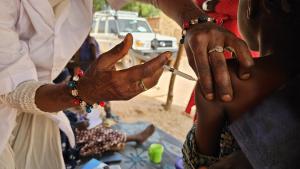Niger in the race to end diphtheria outbreak
Niamey – Mariam, a mother of five living in Kantché, a rural community in Niger's southern Zinder region, remembers the difficult time she went through earlier this year when two of her five children were hospitalized at the same time. “First, it was my nine-year-old son who came home with a strong cough, complaining of a sore throat. He coughed all night and it only got worse. He was finally hospitalized at the Kantché health centre, where his 11-year-old sister also fell ill and, in the end, both were lying there fighting the deadly disease. It was very difficult for me.”
Mariam’s children fell ill with diphtheria, a contagious infection caused by a bacterium whose typical symptoms include a sore throat, fever, swollen neck glands and weakness. It can lead to heart or nerve complications and even to paralysis and death. Diphtheria is vaccine-preventable and its highest mortality rate is in young children.
Since July 2023, Niger has been grappling with an outbreak of diphtheria, which was first reported in Zinder region and has now spread to seven of the country’s eight regions. As of 19 November 2023, a total of 2936 cases and 216 deaths had been recorded across all the affected regions.
Two other West African countries – Nigeria and Guinea – have witnessed an unusual increase in diphtheria cases in recent months. World Health Organization (WHO) is supporting the national authorities bolster outbreak response. In Niger, WHO provided support in developing an outbreak response plan and protocols for care for people with diphtheria. The Organization is also supporting the training of field responders to ensure adequate personnel skilled in disease surveillance and management. Medicines and diphtheria antitoxin serum have also been made available to the country for treatment.
Recent diphtheria outbreaks in the subregion point to the urgent need to strengthen vaccination coverage through national immunization programmes. WHO supports countries in strengthening routine surveillance and immunization, conducting reactive mass vaccination campaigns, and adequately managing cases to prevent a wider spread of the outbreak.
In Niger, although the vaccination coverage with the third dose of the pentavalent vaccine (which includes the diphtheria vaccine) is on the uptick, it is still below the 90% prescribed in global, regional and national immunization strategies. A vaccination campaign was conducted in Matameye district in Zinder region, from 20 to 24 November, targeting more than 290 000 children aged 0–14 years in the first round. Zinder is the most affected region, reporting 48.7% of cases nationally.
About US$ 450 000 from the WHO Contingency Fund for Emergencies and US$ 170 000 internally through other programmes have been provided to support the deployment of nearly 1000 front-line responders including vaccinators, social mobilizers and supervisors to implement and monitor vaccination campaigns.
“First, the vaccine response contributed to the coverage of 72% of cases that present with the disease and second, it reduced recorded deaths by 94%. The campaign has also enabled us to strengthen routine vaccination in the affected areas by reaching the zero-dose or under-vaccinated children. Similarly, the epidemiological surveillance system has been strengthened through case detection, notification and management” explains Dr Diaw Mor, Emergency Coordinator at the WHO Country Office.
Dr Sani Ousseini Lawali, Chief Medical Officer of Matameye district pints out that health centres have been instructed to step up vigilance during the outbreak. “It is crucial to start treatment immediately for suspected cases of diphtheria without waiting for confirmation of laboratory tests that may take time,” he says.
In the case of Mariam's children, the strategy paid off. She is delighted to have returned home with her children, who have now recovered.
Administrative authorities, traditional and religious leaders have been involved in the efforts to raise public awareness about vaccination campaigns and to mobilize the population to take up vaccination. About 120 community mobilizers have been trained on case detection and referral to health centres.
In Kantché, Mariam is also committed to becoming a vaccination champion. “With the experience I had in the hospital, especially in about unvaccinated children, I saw first-hand how important and even indispensable vaccination is.”
“By the grace of God and the good work of the doctors, my children are doing well now. I'm very happy,” Mariam says.
Communications Officer
WHO Regional Office for Africa
Email: dialloka [at] who.int (dialloka[at]who[dot]int)
Consultante/COM
OMS Niger
+227 92 19 48 24
djibom [at] who.int (djibom[at]who[dot]int)
